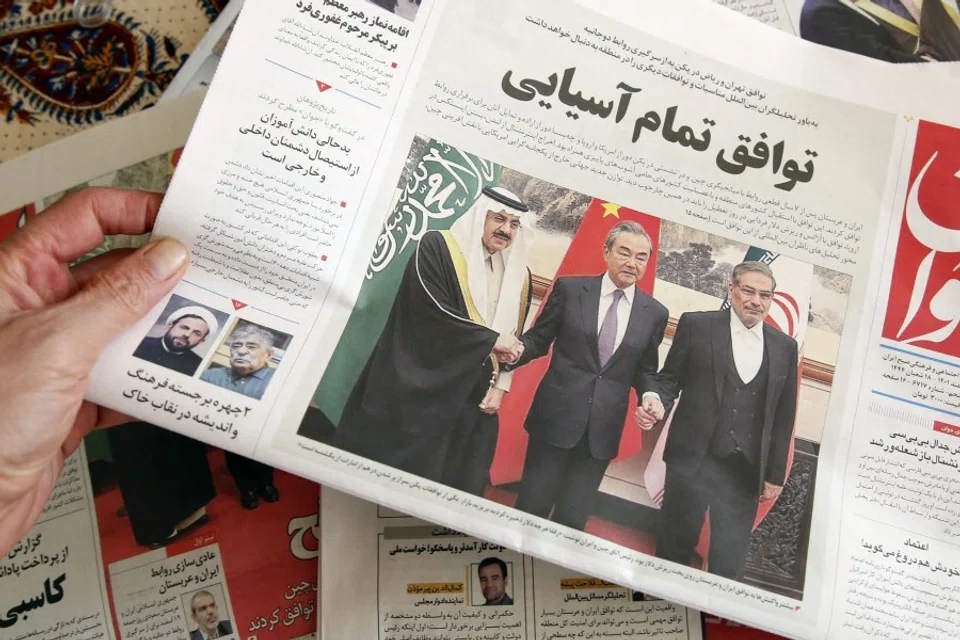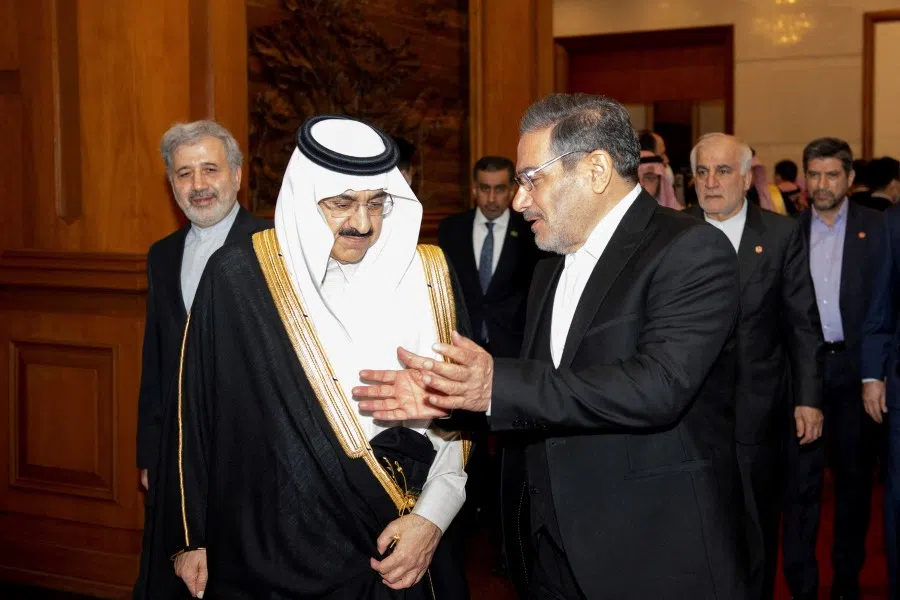Saudi-Iran deal: China's Global Security Initiative is working
Beijing's mediation of the historic rapprochement between Saudi Arabia and Iran is a sign that its much-vaunted Global Security Initiative (GSI) is working. The bigger challenge is bringing the GSI into action with respect to the war in Ukraine.

On 10 March, Saudi Arabia and Iran announced a historic resumption of diplomatic relations after a seven-year rift. The development has embarrassed the US, which has been seeking to broker a deal between Saudi Arabia and Israel to form a formal diplomatic tie to contain Iran. American media and analysts lament that the Saudi-Iranian rapprochement exposes Washington's diminished power and influence in the Middle East.
A noteworthy detail is that the three countries used Mandarin, Arabic and Farsi, not English, to negotiate the deal.
Beijing's quiet diplomacy
Beijing has been conducting quiet diplomacy over the past few months to mediate the deal. Since 2021, Saudi Arabia and Iran have conducted sporadic negotiations, with the facilitation of Iraq and Oman. President Xi Jinping offered to broker a peace deal twice: during his visit to Saudi Arabia in December 2022 and during Iranian President Ebrahim Raisi's state visit to Beijing in February 2023. He got a positive response from both countries.
After reaching a consensus, all three parties met again in Beijing to finalise the deal and issued a joint statement on the rapprochement on 10 March. A noteworthy detail is that the three countries used Mandarin, Arabic and Farsi, not English, to negotiate the deal. A Chinese media report praised the parties for keeping the negotiation secret, as "the US would have tried to jeopardise the deal".
However, an assessment of the deal from the lens of Sino-US geopolitical competition would be short-sighted because the deal benefits all three parties. The deal came as China reopened its borders and economy after three years of a strict "zero-Covid" policy.
For the past year, the world has witnessed China's lowest GDP growth in decades, and the West has been pessimistic about China's economic recovery. China imports 40% of its crude oil from the Middle East and is Saudi Arabia and Iran's largest trading partner. The last thing Beijing wants to see is the two countries locked in a conflict that could upend peace and stability in the region.

For Saudi Arabia and Iran, the seven-year conflict has exhausted both countries' resources and patience. Saudi Arabia's national strategic framework, termed Vision 2030, aspires to transition its energy-dependent economy to become a green and sustainable country and a regional hub for tourism. Iran's economy has been crippled by severe US-led economic sanctions and a currency crisis. The Republic has also seen popular uprisings. Thus, reconciliation was urgently needed for both countries.
Neither the US nor Russia can play such a role as an honest broker: the US has no credibility with Iranian leaders, and Russia is too busy with its war with Ukraine. As a result, Beijing seized this moment to become involved and prevailed.
Success of China's GSI?
Besides the geopolitical and reputational rewards for China from the deal, Beijing's eagerness to put the Global Security Initiative (GSI) in motion incentivises China to mediate actively between Saudi Arabia and Iran. China's Global Times has published an editorial arguing that the deal is a successful outworking of China's GSI. Wu Bingbing, a Middle East expert at Peking University, expressed a similar view that China's suggestion to form a new security framework in the Middle East is part of the GSI.
But the deal does not give Beijing a home run. China's announcement of the GSI in 2022 was met with scepticism by many Western analysts who viewed it either as a vague and undefined concept, or an attempt to create an alternative to the current US-led security order. Even countries in the global south expressed uneasiness about the GSI. For instance, due to China's past assertiveness in the South China Sea, Southeast Asian states have doubts about whether the GSI can bring peace and stability compared to the current US-led regional security arrangement.
This means that the concept of GSI is inchoate, and will become more fully formed through a learning-by-doing process.

In the end, the GSI's future trajectory may mirror that of the Belt and Road Initiative (BRI). Launched in 2013, the BRI has received both praise and criticism, but has shown resilience and evolved over time. To understand this in a more theoretical way, Ze Jinghan, a professor of International Relations at Lancaster University, argues in his book Slogan Politics that many new Chinese foreign policy concepts, including the BRI, should be seen as multifunctional slogans for political communication on both the domestic and international stages rather than well-thought-out strategic plans reflecting Beijing's concrete geopolitical vision.
Therefore, the GSI is created to cater to China's needs: to safeguard China's security while expanding political influence globally. As things stand, foreign policy practice is required to fill in the details. This means that the concept of GSI is inchoate, and will become more fully formed through a learning-by-doing process.
President Xi's efforts to promote a political settlement to the Russia-Ukraine conflict would be essential to watch. If another success is achieved, it will lend more credence to the GSI.
Political settlement to the war in Ukraine
The GSI serves as a banner for China to reform the current international security order, especially at a time when the US is prioritising alignment with countries that share the same political system and ideology. Washington is seeking to form a democratic alliance against China. Inside China, a comparison between China and the US follows that China builds roads, and America builds blocks.
As China's power and influence continue to grow, it seeks to have a fair say in international peace and security architecture building. Specifically, the Global Security Initiative Concept Paper released by China's Ministry of Foreign Affairs in February 2023 identifies "bringing about security through political dialogue and peaceful negotiation" as core concepts and principles. China's successful brokering of the peace deal between Saudi Arabia and Iran has given it confidence that this trajectory can work. The aspiration is that China can fill the gap in regions the US fails to lead or ignores.
The Global Security Initiative Concept Paper also emphasises the need to support political settlements of hotspot issues such as the war in Ukraine. Therefore, President Xi's efforts to promote a political settlement to the Russia-Ukraine conflict would be essential to watch. If another success is achieved, it will lend more credence to the GSI.
This article was first published by ISEAS - Yusof Ishak Institute as a Fulcrum commentary.
Related: Saudi-Iran deal: Diplomacy with Chinese characteristics gaining ground | China's entry into the Middle East: Beginning of China-US full-scale confrontation | Differences between the US and China in Middle East peace advocacy | Xi's Global Security Initiative: In pursuit of China's own interests and ambitions | Global Security Initiative - China's solution to international security? | China's Global Security Initiative stoking regional tensions | The Chinese offer of a Global Security Initiative: Anything new? | Why the Global Security Initiative is important for Asia-Pacific security



![[Big read] When the Arctic opens, what happens to Singapore?](https://cassette.sphdigital.com.sg/image/thinkchina/da65edebca34645c711c55e83e9877109b3c53847ebb1305573974651df1d13a)
![[Video] George Yeo: America’s deep pain — and why China won’t colonise](https://cassette.sphdigital.com.sg/image/thinkchina/15083e45d96c12390bdea6af2daf19fd9fcd875aa44a0f92796f34e3dad561cc)
